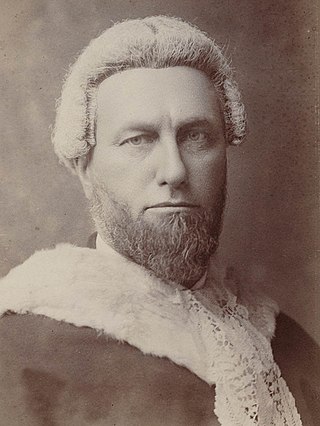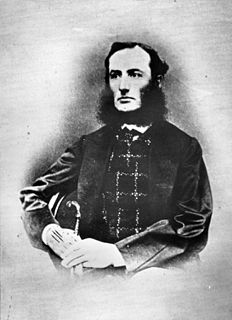Related Research Articles

Sydney Smith was an Australian politician. He began his parliamentary career in the New South Wales Legislative Assembly and served as a government minister under Henry Parkes. He transferred to the new House of Representatives after Federation, representing the Division of Macquarie from 1901 to 1906. He served as Postmaster-General in the Reid Government from 1904 to 1905.

Sir William Charles Windeyer was an Australian politician and judge.
New England and Macleay was an electoral district of the Legislative Assembly in the Australian state of New South Wales from 1856 to 1859, in the Northern Tablelands region of New England and part of the Mid North Coast region, including the area to the north of the Macleay River. but excluding the area south of the Macleay River which was included in the Counties of Gloucester and Macquarie. To the north was the electorate of Clarence and Darling Downs and to the west the electorate of Liverpool Plains and Gwydir. It elected two members, with voters casting two votes and the first two candidates being elected. It was partly replaced by New England.

James Henry Young was an Australian colonial businessman and politician and Speaker of the New South Wales Legislative Assembly.
Thomas George Rusden was a squatter and politician in colonial New South Wales. He was a member of the Legislative Council between 1855 and 1856 and a member of the Legislative Assembly for one term between 1856 and 1857.
The second Parkes ministry was the sixteenth ministry of the Colony of New South Wales, and was led by Sir Henry Parkes. It was the second of five occasions that Parkes was Leader of the Government.
This is a list of members of the New South Wales Legislative Council from 1843 to 1851. The 1843 Electoral Act prescribed 36 members, 24 to be elected, 6 appointed by virtue of their office and 6 nominated. The appointments and elections were for five year terms and thus occurred in 1843,</ref> and 1848. The Speaker was Alexander Macleay until 19 May 1846 and then Charles Nicholson. The parliament was dissolved on 30 June 1851 as a result of the 1851 Electoral Act which increased the number of members in the Council to 54.

The Electoral district of County of Durham was an electorate of the New South Wales Legislative Council at a time when some of its members were elected and the balance were appointed by the Governor. It was named after Durham County, which lies on the north side of the Hunter River.
This is a list of members of the New South Wales Legislative Council from 1851 to 1856. The 1851 Electoral Act increased the number of members in the Council to 54, 18 to be appointed and 36 elected. The initial appointments were made in October 1851.</ref> The Speaker was Charles Nicholson.

Walter Hussey Vivian was an Australian politician.

Abram Orpen Moriarty was an Irish-born Australian politician.
The 1858 New South Wales colonial election was to return 54 members of Legislative Assembly composed of 34 electoral districts with 18 returning 1 member, 13 returning 2 members, two returning 3 members and one returning 4 members, all with a first past the post system. In multi-member districts, because each voter could cast more than one vote, it is not possible to total the votes to show the number of voters and voter turnout in these districts is estimated. 17 members from 14 districts were returned unopposed. The electoral districts and boundaries were established under the Electoral Act 1851 (NSW) for the former Legislative Council.
A by-election was held for the New South Wales Legislative Assembly electorate of New England and Macleay on 26 November 1858 because of the resignation of Abram Moriarty, for reasons that included the difficulty of serving a far distant electorate.
In October 1894 the Elections and Qualifications Committee conducted a re-count of the 1894 Grenfell election, in which George Greene had been declared elected by a margin of 2 votes over Michael Loughnane (Labour). The Elections and Qualifications Committee consisted of 9 members, 5 Free Trade and four Protectionist.
The Hastings, an electoral district of the Legislative Assembly in the Australian state of New South Wales was created in 1859 and abolished in 1880.
In October 1870 the Committee of Elections and Qualifications conducted a re-count of the 1870 The Hastings by-election, in which Horace Dean had been declared elected over Robert Smith. The Committee declared that Horace Dean was not qualified to be a member and that Robert Smith had been elected.
A by-election was held for the New South Wales Legislative Assembly electorate of Hastings and Macleay on 23 September 1898 because Francis Clarke resigned to allow Edmund Barton to re-enter parliament.
A by-election was held for the New South Wales Legislative Assembly electorate of University of Sydney on 5 October 1876 because of creation of the district. The Electoral Act 1858 (NSW) provided that the district would be established once there were 100 people who had graduated from the University of Sydney with a Doctor of Laws, Doctor of Medicine or Master of Arts. In June 1876 the University an additional graduate with a Doctor of Law and 10 with a Master of Arts, bringing the total to 111. Voting was restricted to members of the university senate, professors, public teachers and examiners, the principals of incorporated colleges within the university, masters of arts, doctors of laws or medicine and members of the University who were entitled to vote for the university senate.
A by-election was held for the New South Wales Legislative Assembly electorate of West Sydney on 8 January 1863 because William Windeyer resigned. Windeyer was a member of the victorious NSW rifle team which had traveled to Melbourne for a rifle match. They were returning to Sydney on the City of Sydney, an iron steamship, when it struck rocks and sank at Green Cape. While all passengers and crew survived, the Australian Dictionary of Biography states it affected Windeyer's mental and physical health which led to his resignation. Windeyer's letter to the electors of West Sydney refers to the successful passage of the Lands Act, the abolition of state aid to religion, and the pursuit of his profession as a barrister.
References
- 1 2 Twomey, Anne (2004). The Constitution of New South Wales. Federation Press. pp. 439. ISBN 9781862875166 . Retrieved 21 September 2020.
- 1 2 "Petition: district of the Hastings". New South Wales Government Gazette . No. 45. 23 February 1870. p. 455. Retrieved 21 September 2020– via Trove.
- ↑ "Legislative Assembly: petition". The Sydney Morning Herald . 25 February 1870. p. 2. Retrieved 21 September 2020– via Trove.
- ↑ "Legislative Assembly: electorate of the Hastings". The Sydney Morning Herald . 7 May 1870. p. 4. Retrieved 21 September 2020– via Trove.
- ↑ "Writ of election: The Hastings". New South Wales Government Gazette . No. 111. 10 May 1870. p. 1051. Retrieved 21 September 2020– via Trove.
- ↑ "Late election for the Hastings". Evening News . 30 July 1870. p. 2. Retrieved 21 September 2020– via Trove.
- 1 2 Electoral Act of 1858 No 23 (NSW) also identified as 22 Victoria No 20.
- ↑ Aliens Act 1847 No 39 (NSW), identified as 11 Victoria No 39.
- ↑ "New South Wales Constitution Act 1855 (UK)". New South Wales Government Gazette . No. 164. 24 November 1855. p. 3110. Retrieved 21 September 2020– via Trove.
- 1 2 Twomey (2004), p. 399.
- 1 2 3 "The Hastings electorate". The Sydney Morning Herald . 7 May 1870. p. 7. Retrieved 21 September 2020– via Trove.
- ↑ "Is the late member for the Hastings now qualified to be elected a member of the Assembly?". The Sydney Morning Herald . 24 May 1870. p. 3. Retrieved 21 September 2020– via Trove.
- ↑ Teale, Ruth. "Dean, Horace (1814 - 1887)". Australian Dictionary of Biography . Melbourne University Press. ISSN 1833-7538 . Retrieved 21 September 2020– via National Centre of Biography, Australian National University.
- ↑ Green, Antony. "1864-5 Hastings". New South Wales Election Results 1856-2007. Parliament of New South Wales . Retrieved 29 April 2020.
- ↑ "Nomination for the Hastings (Abridged from the Macleay Herald)". The Sydney Morning Herald . 23 June 1870. p. 2. Retrieved 21 September 2020– via Trove.
- ↑ Cunneen, Chris. "Smith, Robert Burdett (1837–1895)". Australian Dictionary of Biography . Melbourne University Press. ISSN 1833-7538 . Retrieved 21 September 2020– via National Centre of Biography, Australian National University.
- ↑ "The Hastings election (from the Macleay Independent)". The Sydney Morning Herald . 28 June 1870. p. 3. Retrieved 21 September 2020– via Trove.
- 1 2 Green, Antony. "1870 The Hastings by-election". New South Wales Election Results 1856-2007. Parliament of New South Wales . Retrieved 21 September 2020.
- ↑ The petition on 11 August stated a higher result, Dean 1,226 votes, Smith 482 votes. "The Hastings petition". New South Wales Government Gazette . No. 197. 16 August 1870. p. 1755. Retrieved 21 September 2020– via Trove.